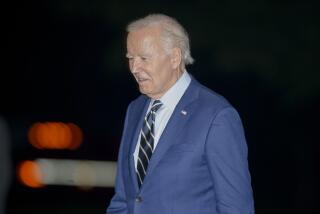Kerry, Netanyahu discuss Iran’s nuclear aims
JERUSALEM -- U.S. Secretary of State John F. Kerry and Israeli Prime Minister Benjamin Netanyahu met in Rome for seven hours Wednesday evening, double-billed as discussions on Iran and Israeli-Palestinian peace talks.
Headed into the meeting, both leaders appeared to agree in their concern that Iran must not be able to develop a nuclear weapon and that diplomatic means were the best way toward achieving this goal.
Welcoming the change of tone and diplomatic opening offered by Iran’s new leadership, Kerry stressed that the U.S. will need to know that actions are being taken to make it “crystal clear, undeniably clear, fail-safe to the world” that whatever nuclear program Iran pursues is a peaceful one.
These actions, according to Netanyahu, must involve complete dismantling of Iran’s uranium-enrichment capabilities and removal of amassed fissile material from the country, as well as halting the country’s plutonium track. “A partial deal that leaves Iran with these capabilities is a bad deal,” Netanyahu said.
Perceived gaps between the U.S. and Israeli positions on allowing Iran to retain enrichment capabilities were not bridged in the long meeting, according to reports. Other U.S. allies in the Middle East appear to share Israel’s concerns.
As Kerry and Netanyahu met in Rome, U.S. and Israeli officials met in Washington for the latest round of Strategic Dialogue talks, regularly scheduled twice a year.
According to a State Department statement, Deputy Secretary of State William Burns and Israeli Minister for Strategic and Intelligence Affairs Yuval Steinitz discussed a wide range of regional issues as well as bilateral matters.
If Iran wants civilian nuclear energy and the world seeks guarantees that it will not produce nuclear weapons, this can be easily solved, according to Steinitz, by Iran buying its nuclear fuel from a third country.
Iran has no reason to retain enrichment capabilities “unless they wish to remain only a short distance from the ability to produce a bomb, and we will not accept this,” Steinitz told Israeli media Thursday.
The possibility of reaching a deal with Iran, the stability of its new regime and military options in the matter are also among the topics being discussed Thursday by Israeli and international experts at a daylong panel titled “Iran at a Crossroads” being held at the Institute for National Security Studies, a Tel Aviv think tank.
Speakers will be answering questions posted on the institute’s Facebook page.
ALSO:
Arab states and Western nations push Syria peace talks
Prince George: British royal family christens an heir to throne
U.S.-Pakistan relationship has nowhere to go but up, analysts say
Sobelman is a news assistant in The Times’ Jerusalem bureau.
More to Read
Sign up for Essential California
The most important California stories and recommendations in your inbox every morning.
You may occasionally receive promotional content from the Los Angeles Times.










